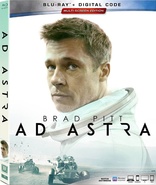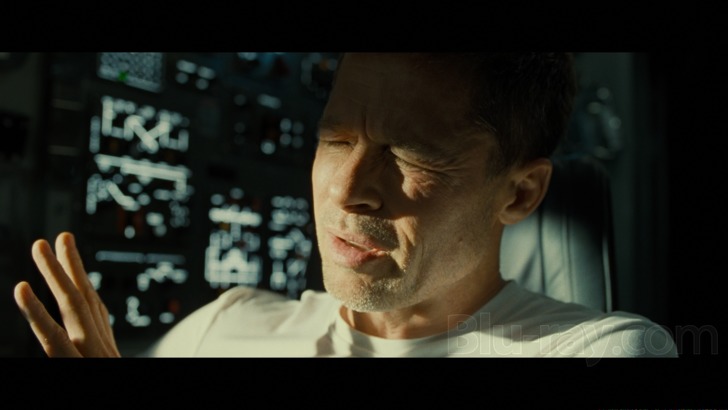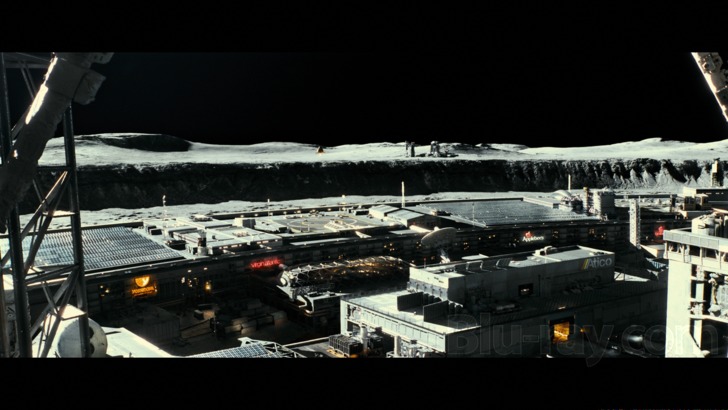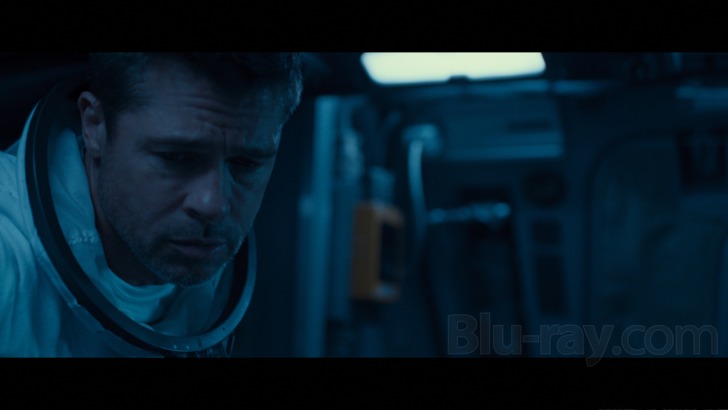Ad Astra Blu-ray Movie
HomeAd Astra Blu-ray Movie 
Blu-ray + Digital Copy20th Century Fox | 2019 | 124 min | Rated PG-13 | Dec 17, 2019

Movie rating
7 | / 10 |
Blu-ray rating
| Users | 0.0 | |
| Reviewer | 4.0 | |
| Overall | 4.0 |
Overview
Ad Astra (2019)
An Army Corps engineer searches across the galaxy for his father, who disappeared on a mission to find alien life 20 years ago.
Starring: Brad Pitt, Tommy Lee Jones, Ruth Negga, Donald Sutherland, Kimberly EliseDirector: James Gray (I)
| Sci-Fi | 100% |
| Adventure | 57% |
| Drama | 35% |
| Mystery | 33% |
Specifications
Video
Video codec: MPEG-4 AVC
Video resolution: 1080p
Aspect ratio: 2.39:1
Original aspect ratio: 2.39:1
Audio
English: DTS-HD Master Audio 7.1
Spanish: Dolby Digital 5.1
French: Dolby Digital 5.1
Subtitles
English SDH, French, Spanish
Discs
Blu-ray Disc
Single disc (1 BD)
Digital copy
Packaging
Slipcover in original pressing
Playback
Region free
Review
Rating summary
| Movie | 4.0 | |
| Video | 4.5 | |
| Audio | 4.5 | |
| Extras | 3.0 | |
| Overall | 4.0 |
Ad Astra Blu-ray Movie Review
My father, who art in the heavens.
Reviewed by Jeffrey Kauffman December 14, 2019Ad Astra is certainly one of the odder science fiction epics to come down the pike and/or Milky Way in some time, which may be why despite an impressive physical production and interesting performance from star Brad Pitt it seemed not to connect in an overwhelming way with ticket buying audiences. While Ad Astra plies the same “search for intelligent life” territory that any number of venerable cinematic antecedents like 2001: A Space Odyssey and Star Trek: The Motion Picture have, in this case it does so within the context of a focal character who has some pretty significant “Daddy issues”, issues which provide a lot of emotional grist for the mill as the story unfolds. Major Roy McBride (Brad Pitt) has been a devoted astronaut working for the NASA-esque SpaceCom (Space Command), and in one of the film’s more inventive reveals, his opening voice over and some quick montage-like vignettes which seem to be resolutely Earthbound ultimately offer the thrilling sight of McBride climbing out onto the ladder of a space station situated high above the Earth. When a mysterious series of electromagnetic charges hit the space station, McBride is sent hurtling toward Earth, but his calm demeanor (something that itself plays into the plot) keeps him from panicking, and rather incredibly he’s able to deploy a parachute and land safely. His insanely low resting blood pressure barely notching upward in this trauma alerts his higher ups that he’s one cool cucumber, and he is tasked with heading a secret mission to discover the source of the disruptions, jolts which have been dubbed The Surge and which are wreaking havoc on Earth, causing unparalleled power outages and deaths. In one of the film’s ultimately kind of silly conceits, it turns out that SpaceCom is convinced that Roy’s legendary father H. Clifford McBride (Tommy Lee Jones), himself perhaps the most famous American astronaut of all time, may be behind the maelstrom, somehow sending the pulses from an American installation near Neptune known as The Lima Project. The fact that The Lima Project hadn’t been heard of from decades and that all of its participants have been assumed dead for nearly that long underlies the mystery.

Part of the problem some audiences may have had with Ad Astra is that its features a focal character who is pretty much divorced from his own emotions, as is repeatedly documented throughout the tale, and which in fact seems to be the ultimate point of the screenplay co-written by director James Gray. Gray is evidently on record as stating that he wanted Ad Astra to be yet another cinematic evocation of Joseph Conrad’s epochal Heart of Darkness, and one need only refer to Apocalypse Now or at least Hearts of Darkness: A Filmmaker's Apocalypse to know how calamitous that desire might be. But if Conrad’s tale, and even Coppola’s version, documents a character coming to terms with a certain feral tendency in human behavior, Ad Astra is curiously tamped down, even when it gets to its climax, offering Roy as a virtually emotionless centerpiece who kind of drifts through a number of amazing experiences without having any sizable reactions to them, at least on the surface.
There’s a subtextual element here which basically boils down to whether or not Clifford McBride is a “Kurtz” or not (for those not conversant with Heart of Darkness and/or Apocalypse Now, Kurtz was the crazed villain of the piece). But aside from any allusions to Joseph Conrad, it’s probably Stanley Kubrick who may seem most evoked in Ad Astra. Gray has the same kind of contemplative quality that Kubrick’s science fiction masterpiece offered, and in fact in some of the languid shots of spacecraft floating through a starfield, I half expected to hear either Richard or Johann Strauss on the soundtrack. Perhaps more importantly, though, the plot trajectories in both films posit the “evolution” of a focal character who is hardly given over to any kind of histrionic displays, something that can tend to keep the viewer at arm’s length at times. If the “father” in 2001: A Space Odyssey might be thought of as more of an opaque (literally) cosmic Being, in Ad Astra it’s personalized. As such, Roy is not “reborn” as a Starchild a la Dave in 2001: A Space Odyssey, but he does finally connect to a deeper if not intrinsically “higher” version of himself.
The problem with these similarities for some viewers may be due to the fact that Kubrick seemed to be constructing a largely intellectual enterprise in the first place, whereas Gray seems to be making a case that people need to really connect with their own emotions in order to be fully functioning human beings. Having a main character who comes off as an automaton for virtually an entire film may not ultimately be the best way to depict that need.
Ad Astra Blu-ray Movie, Video Quality 

Ad Astra is presented on Blu-ray courtesy of 20th Century Fox Home Entertainment with an AVC encoded 1080p transfer in 2.39:1. Shot on good, old fashioned film with a variety of cameras and then finished at a 2K DI (all datapoints courtesy of the IMDb), this is another stellar (sorry) looking high definition presentation from the good folks at Fox, though it does have a couple of kind of curious downturns in image quality and grain structure, albeit very fleeting. The film has some very interesting lighting and/or grading choices, some of which can be gleaned from the screenshots accompanying this review. Various sequences are drenched in blues and purples, and one key moment seems to be recreating the kind of dusty red- orange-brown ambience that made The Martian's palette so memorable. Fine detail makes it through these gauntlets surprisingly intact, and Gray's continued use of extreme close-ups throughout the film aid and abet detail levels in elements like Pitt's facial crags. Some of the special effects can be a little hokey (one landing scene kind of reminded me of the quaint miniature work on display in shows like Gerry Anderson's Space: 1999: The Complete Series. Regarding some quick but noticeable downturns in image quality, pay attention during the rescue sequence when there are some fleeting shots of Roy entering the spacecraft which for whatever reason almost look like 16mm, with a sudden and dramatic increase in grain and a concomitant increase in fuzziness, for one example. It's just a second or two, but the difference is hard to miss. On the whole, grain looks nicely resolved, adding a fine sheen to things like the white space helmets or backgrounds of various spacecraft, which also tend to be lighter.
Ad Astra Blu-ray Movie, Audio Quality 

Ad Astra features a nicely immersive DTS-HD Master Audio 7.1 track the provides consistent and sometimes rather boisterous surround activity courtesy of its frequent flights through space. Panning effects are quite pronounced, and some of the liftoffs and landings (there are several scattered throughout the story) provide some floorboard rumbling LFE. Max Richter, the interesting minimalist composer who has become renowned for his "reworkings" of venerable classics like Vivaldi's Four Seasons, provides a somewhat anachronistic score (at least for a sci-fi epic) that also fills the surround channels quite invitingly. Dialogue is rendered cleanly and clearly throughout this problem free track.
Ad Astra Blu-ray Movie, Special Features and Extras 

- Deleted Scenes (1080p; 3:25) offer optional commentary by director James Gray.
- To the Stars (1080p; 8:35) is a decent EPK featuring some interviews and scenes from the film.
- A Man Named Roy (1080p; 8:45) focuses on Pitt and the character he plays. This has some fun footage showing some of the wire work utilized to create a "zero gravity" environment.
- The Crew of the Cepheus (1080p; 9:08) looks at some of the other characters, as well as the rigors of long term space travel.
- The Art of Ad Astra (1080p; 11:15) looks at the film's engaging production design.
- Reach for the Stars (1080p; 7:21) features cast and crew talking about space travel.
- Audio Commentary by James Gray
- Trailers
- Theatrical Trailer (1080p; 2:32)
- IMAX Trailer (1080p; 2:27)
Ad Astra Blu-ray Movie, Overall Score and Recommendation 

There are a number of kind of curious detours Ad Astra takes on its way to its (to quote a certain Cat Stevens) "father and son reunion", including a pirate shootout on the Moon and even more strangely a rescue mission which seems to suggest the primates of 2001: A Space Odyssey most definitely got smarter by touching the monolith (that's a joke, for those who may be wondering). The film probably has a few too many convenient coincidences for its own good, but it's anchored by a really interesting if intentionally tamped down performance by Brad Pitt, and while the visuals don't provide some of the gobsmacking proclivities of Kubrick's masterpiece, they often ape (sorry) Kubrick's mastery of symmetry and a kind of languorous, meditative quality. Technical merits are first rate, and Ad Astra comes Recommended.
Similar titles
Similar titles you might also like

Interstellar 4K
2014

2001: A Space Odyssey 4K
1968

The Martian 4K
Extended Edition
2015

Star Trek: Picard - The Final Season
2023

Mission to Mars
2000

Passengers
2016

Gravity 3D
2013

Space: 1999: The Complete Series
1975-1977

2010: The Year We Make Contact
1984

400 Days
2015

Star Trek: Enterprise: The Complete Series
Budget Re-release
2001-2005

Star Trek: The Motion Picture 4K
The Director's Edition | Remastered
1979

High Life
2018

Doctor Who: The Daleks in Color
1963-1964

Planet of the Apes
1968

Doctor Who: The Complete David Tennant Collection
2005-2010

Contact
1997

Europa Report
2013

Close Encounters of the Third Kind 4K
40th Anniversary Edition
1977

Firefly: The Complete Series
15th Anniversary Edition
2002

